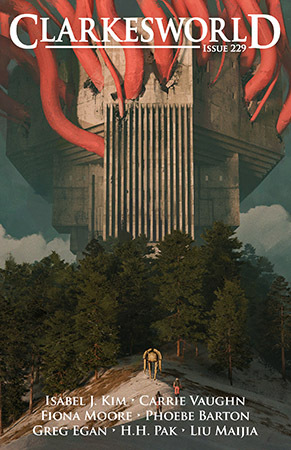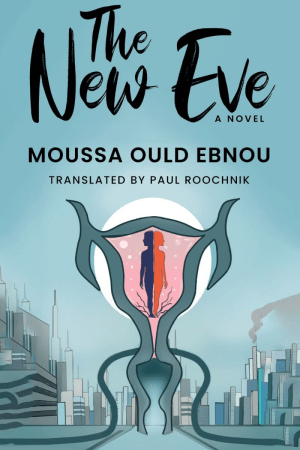Out This Month: October
 “Giant Grandmother” by Liu Maijia, translated from the Chinese by Blake Stone-Banks (Clarkesworld, October 1)
“Giant Grandmother” by Liu Maijia, translated from the Chinese by Blake Stone-Banks (Clarkesworld, October 1)
Black Hole Heart and Other Stories by K. A. Teryna, translated from the Russian by Alex Shvartsman (Fairwood Press, October 1)
The world is not how we perceive it. A blizzard may be the fury of a whale god. Intelligent bees watch our every move. Monsters lurk in the metro underpasses while others haunt our dreams. Are we asleep in frozen sarcophagi, en route to a new planet? Should we swallow jellyfish, drink colors, or repaint the sky? This book has the answers. But in return, it might steal your heart.

The Inner Harbour by Antoine Volodine, translated from the French by Gina M. Stamm (University of Minnesota Press, October 7)
A beguiling, perspective-shifting story of obsession and loss set in the grimy, late-colonial decadence of Macau at the end of the twentieth century.
 The Lucky Ride by Yasushi Kitagawa, translated from the Japanese by Takami Nieda (Harper One, October 7)
The Lucky Ride by Yasushi Kitagawa, translated from the Japanese by Takami Nieda (Harper One, October 7)What if a single journey could change everything for you? What if it could lead you to new possibilities, help you reconnect with loved ones, or bring peace to your past? In this charming story, the unluckiest man in Japan is given a chance to flip his fortunes when a mysterious driver appears, offering him the opportunity to seize a new path. Life’s setbacks can often feel overwhelming, but in The Lucky Ride, you’ll embark on a journey of self-growth that shows us that luck isn’t something you’re born with—it’s a result of the choices you make and the positive energy you bring into the world.

Diving Board by Tomás Downey, translated from the Spanish (Argentina) by Sarah Moses (Invisible Publishing, October 7)
Tomás Downey writes from the edge of the abyss. A little girl disappears midair; a horse grows from a seed; a war widow receives a visit of condolence, over and over and over again. In “The Astronaut” a man has become weightless, bobbing around on the ceiling, nauseated every time he is brought down and tethered to the earth. But the question here is not “how” or “why,” it’s “what happens next?” The astronaut wonders “Will I burn like an asteroid or drown in the void of space?” just as all of Downey’s stories reside in that threatening, destabilizing moment when all connection is lost. The world is filled with an ever-thickening mist, an old love haunts the living, making fruit rot in the bowl, and resolution isn’t offered or even sought—the human condition is queasy, fretful, absurd. All we can hope for is the leap into the unknown.

Eye of the Monkey by Krisztina Tóth, translated by Ottilie Mulzet (Seven Stories Press, October 14)
Eye of the Monkey begins in the wake of a devastating civil war that led to the formation of the United Regency, an autocracy in an unnamed European country. The ravages of war are sweeping, and the populace has been divided into segregated zones, where the well-off are under mass surveillance and the poor are phantom presences, confined and ghettoized. On the verge of a nervous breakdown after being followed by a young man for weeks, Giselle, a history professor at the New University, seeks the help of Dr. Mihály Kreutzer, a psychiatrist who is navigating divorce and the recent death of his mother. They soon begin a torrid love affair, but everything is not what it seems. As Giselle begins to unpack her family history and the possible root of her psychological crisis, Dr. Kreutzer, who has ties to some of the most powerful people in the country, possesses ulterior motives of his own.
 Sea Now by Eva Meijer, translated from the Dutch by Anne Thompson Melo (Two Lines Press, October 14)
Sea Now by Eva Meijer, translated from the Dutch by Anne Thompson Melo (Two Lines Press, October 14)The catastrophe that everyone knew was coming has arrived—the dykes are breached, the tideline rises a kilometer a day, and the citizens of the Netherlands are forced into gyms and shelters in Germany and Belgium. The foxes and rabbits head inland across the dunes. The politicians make empty speeches and fret the optics. The Hague—“the center of peace and justice”—slips beneath the rising water. Online retailers do flash sale promotions on disaster kits. There is violence and looting, but some people are too tired to start over again and simply walk into the rising tide. Not willing to simply move on, three women get into a small boat and ride back out over the flooded cities, looking for loved ones they know are likely drowned. On the way, they witness a world retaken by seabirds, whales, and kelp forests. The sea has spoken, and there’s nothing left to be done but listen
 The Call of the Friend by JaeHoon Choi, translated from the Korean by Janet Hong (Honford Star, October 17)
The Call of the Friend by JaeHoon Choi, translated from the Korean by Janet Hong (Honford Star, October 17)University student Wonjun visits his friend Jingu’s basement apartment, only to find unsettling changes that are somehow tied to a K-pop star’s suicide. Jingu behaves coldly, a strange statue looms in the corner, and reality begins to fracture. Blurring the lines between hallucination and nightmare, this graphic novel by JaeHoon Choi explores guilt and despair through a Lovecraftian lens, creating a haunting tale of emotional and cosmic horror.

The New Eve by Moussa Ould Ebnou, translated from the French and Arabic by Paul Roochnik (Iskanchi Press, October 20)
The New Eve is a haunting and philosophical speculative novel that delves into the core of what it means to love, to resist, and to be human in a technologically dominated future. Set in a totalitarian society where human reproduction is mechanized, emotional bonds are forbidden, and gender identity is strictly controlled, this visionary story imagines a world devoid of connection—and the rebellion that stirs within. Adam and Maneki, two outliers in this hyper-controlled world, form a bond that defies the laws of their society. As they struggle against a system that criminalizes affection and individuality, they encounter androgynes who exist outside the binary, challenging the regime’s rigid definitions of identity and desire. Through their journey, the story examines the suppression of love, the ethics of technological advancement, and the resistance that grows from within the human spirit.
 Darker Days by Thomas Olde Heuvelt, translated from the Dutch by ? (Harper, October 28)
Darker Days by Thomas Olde Heuvelt, translated from the Dutch by ? (Harper, October 28)Sometimes you think you can see things behind the fence. Bad things. So it’s better not to look . . . In Lock Haven, a quiet little town in Washington State, Bird Street is a special place. The residents of this pretty cul-de-sac on the edge of the woods are all successful, healthy, and happy. Their children are prodigies; well-mannered and… unnaturally smart. But come November, the “Darker Days” descend, bringing accidents, bad luck, conflict, and illness. Luana and Ralph Lewis-da Silva prepare for this, and so do their children Kaila and Django. It is in November when a stranger appears to collect on a longstanding debt. A price must be paid for the good fortune they enjoy the rest of the year. A sacrifice must be made. So it has been for over a century. To assuage their guilt, the residents of Bird Street choose carefully who will be sent into the woods. Usually, it is an elderly or terminally ill individual who wishes to die with dignity and is content to be helped on their way. But this year, things don’t go to plan, and events take a terrifying turn . . .

Blood for the Undying Throne by Sung-il Kim, translated from the Korean by Anton Hur (Tor, October 28)
Blood for the Undying Throne, the sequel to Blood of the Old Kings, from award-winning Korean author Sung-il Kim and translated by the world-renowned Anton Hur, is an epic fantasy adventure where the corpses of sorcerers power an empire and ordinary people rise up to tear it down.

The Voice of Blood by Gabriela Rábago Palafox, translated from the Spanish by M. Elizabeth Ginway and Enrique Muñoz-Mantas
A groundbreaking collection of short stories that intertwines themes of identity, desire, trauma, and transformation with a haunting gothic sensibility. The stories within explore deeply personal and globally resonant themes, from gender-based violence and ecological precarity to social taboos and the vulnerability of marginalized identities. A pioneer in the wave of Latin American writers revitalizing literary horror to confront contemporary political and environmental crises, Rábago Palafox reimagines gothic traditions through a feminist lens, using the vampire to show women as empowered rather than victimized. Her stories deftly balance the speculative, queer, and deeply human, offering readers a chilling yet thought-provoking exploration of societal anxieties, identity, and memory.



